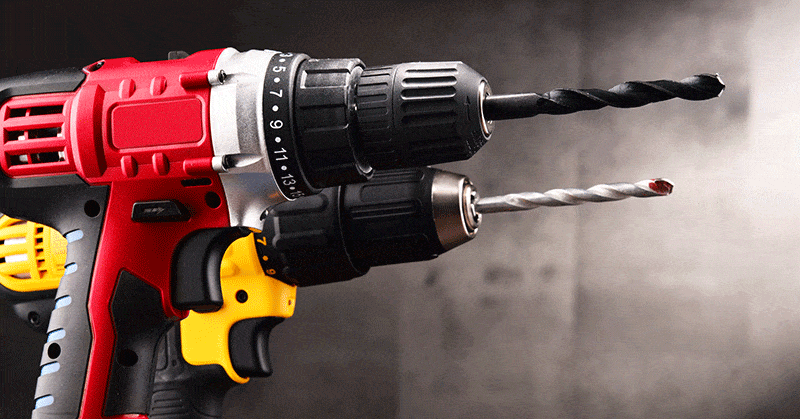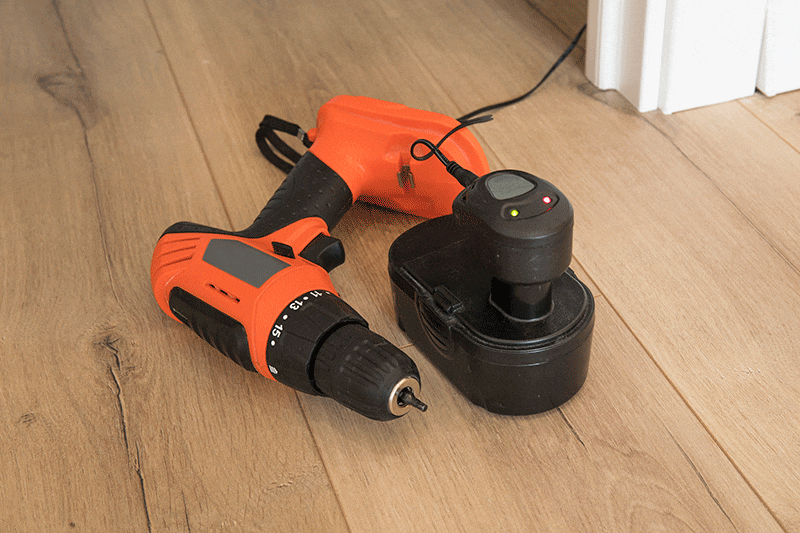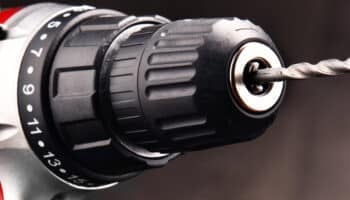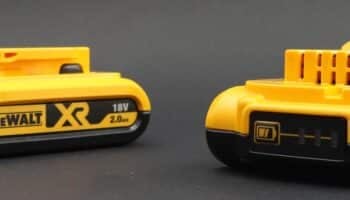We've independently reviewed this article to make sure it's as accurate as we can make it.
To find out more about our article creation and review process, check out our editorial guidelines.
Are you having a hard time comparing a 12v vs 18v drill?
Don’t worry, this is a common issue. Understanding their differences can be a bit tricky, especially since there’s not a ton of information readily available.
But the good news is that you’ve come to the right place for answers. In this article, you’ll learn all about their main advantages and disadvantages.
12-volt cordless drills & tools are great for everyday tasks due to their smallest size, lighter weight, and lower power. On the other hand, the 18-volt variety is more powerful, heavier, and larger, ideal for heavy-duty tasks.
Read on to learn more about their differences!
Comparing 12-Volt vs 18-Volt Cordless Drills & Tools
Are you looking for the biggest and most powerful cordless drill and tools? Or are you after something compact and lightweight? Do you want something that will charge quickly? Or is the price of the tool making the decision for you?

You see, there are so many factors to consider when choosing tools. To help you make the best choice, check out the comparison below. It will discuss the differences in features between 12-volt and 18-volt cordless drills and tools.
#1 Power
What kind of tasks will you be doing with your cordless drills and tools?
For heavy-duty, high-stress tasks, 18-volt tools are necessary. But if you will only use your cordless drill or tools for odd jobs around the home, a 12-Volt tool will be perfectly suited for you.
You see, 12-volt drills and tools are great for everyday jobs like assembling furniture, drilling small holes, or hanging curtains. This is because they provide you with ample power to complete these tasks successfully without the added bulk of a larger tool.
But if you are going to do any rigorous work, such as installing decking, drilling larger holes in wood or metal, or building structures, you may be better off with more powerful tools.
If you plan to do both small and heavy-duty tasks, purchasing an 18-Volt tool may be a better long-term investment since it can handle both types of jobs.
#2 Weight
I get it. Tools are tools, we expect them to be a little heavy. But do you spend a lot of time working in awkward spaces, or even working in spaces above you? Then the weight of your tools is an issue.
12-volt cordless drills and tools tend to be much lighter than those with 18-volts. They’ll help you avoid wrist fatigue and keep a steady hand.
But, if you don’t mind having a slighter heavier tool because you won’t use it for extended periods, then 18-volt tools may be a better fit.
Some 18-volt cordless drills, for example, are 1 pound heavier or more than their 12-volt counterparts. This weight difference can really be of value during a long day of drilling.
#3 Size
How much room is there in your tool kit? If you’re like me, then I’m sure you’d agree that there’s never enough.
That’s why I like to opt for smaller tools. I do this so that I can fit a wider variety of tools in my toolbox to take with me on a job.
If you are looking for a small cordless drill and tools, you should choose within the 12-volt range. If you’re not limited by how much you can carry, choose from the 18-volt range.
#4 Charge Time
There’s nothing worse than waiting for cordless tools to fully charge. The wait seems to be agonizing, and time doesn’t seem to budge when there’s a job waiting that you’re itching to start.
Generally, 12-volt cordless drills and tools charge faster. This is because their batteries are smaller. If you are often charging your tools in a hurry, the 12-volt range will be best suited to you.

However, many manufacturers offer quick-charge batteries and chargers for those who need fast, dependable 18-volt recharging.
#5 Run-Time
Have you ever been in the middle of a job when the battery on your cordless tool ran flat? Now, that’s a horrible mix of both frustrating and time-consuming. So let’s get you kitted out with a cordless drill or tool with a long run-time.
18-volt cordless drills and tools have a longer run time. They can drive heavier loads without slowing down the battery.
If you have a long day of work ahead of you, 18-volt tools will be the best match.
#6 Price
Cordless drills and tools are expensive. Are you looking to save a little money?
12-volt cordless drills and tools are generally less expensive than those with 18-volts. And the price difference is quite something.
The great thing about 12-volt tools is that you get a great tool at a reasonable price. What more could you ask for?
Overall Recommendation
So what’s the verdict? If you are looking for a new set of tools are you better off buying a 12-volt or an 18-volt set?
It seems like a 12-volt cordless drill and tool set is best. It ticks more boxes and is versatile. It will get the job done without being too heavy, taking up too much room in your toolbox, or burning a hole in your wallet.
Ok, so when should you choose an 18-volt cordless drill or tool? You should choose an 18-volt drill or tool if the following describes you:
- You need a super powerful tool for heavy-duty, professional work. You are a professional carpenter or installer. You need to rely on extra hard-wearing tools for the toughest of jobs.
18-volt cordless drills for example often have higher RPM (revolutions per minute). This could even help you to get the job faster.
- You need cordless tools that will allow you to keep working for the best part of the day. Perhaps you put them for a quick charge at lunchtime while you grab a coffee and a bite to eat. Besides that, your 18-volt tools will hold their battery while you work around the clock.
Thanks to innovative, new Lithium-ion batteries, some cordless drills for example can hold their charge 50% longer than before. With battery life like this behind you, there will be nothing stopping you from getting the job done!
Conclusion
Choosing between 12-volt and 18-volt cordless drills and tools could be challenging. They are both good for different reasons depending on how you use them. I hope this article has helped you see which tools would be better suited to you.
Choose 12-volt cordless drills and tools if you:
- Are looking for lightweight tools to reduce wrist fatigue
- Like smaller tools that are easy to take on the go
- Want a lightweight tool
- Are looking for tools that charge quickly
- Don’t want to spend too much money
Choose 18-volt cordless drills and tools if you:
- Are looking for the most powerful tool for heavy-duty jobs
- Want a tool with a really long run-time
If this article has been helpful to you, then why not check out some of our other articles and free guides? You could even sign up for our email list!
Have a great day!
— Craig.
Frequently Asked Questions
How Long Do Cordless Drills Last?
Depending on how well you maintain and use the drill, you can expect it to last anywhere between 5–10 years.
Other factors, such as manufacturer, charging time, and operating temperatures will also affect this expected lifespan.
Should I Wear PPE (Personal Protective Equipment) While Using a Cordless Drill?
Absolutely.
While working with this power tool (regardless of the voltage), you should be wearing protective gloves and safety glasses in case some debris comes flying out from the materials you’re drilling into.
Are Cordless Tools Always Better Than Corded Alternatives?
In most cases, yes. But not always.
The advantage of cordless tools is that you have much more independence to work wherever you want, and you don’t have to worry about making sure there’s a wall outlet nearby.
That being said, corded tools tend to be lighter and don’t need to be recharged constantly. At the end of the day, it all comes down to your personal preferences. If you prefer mobility, go cordless. And if you don’t mind the wires and hate the idea of constant recharging, go corded.







